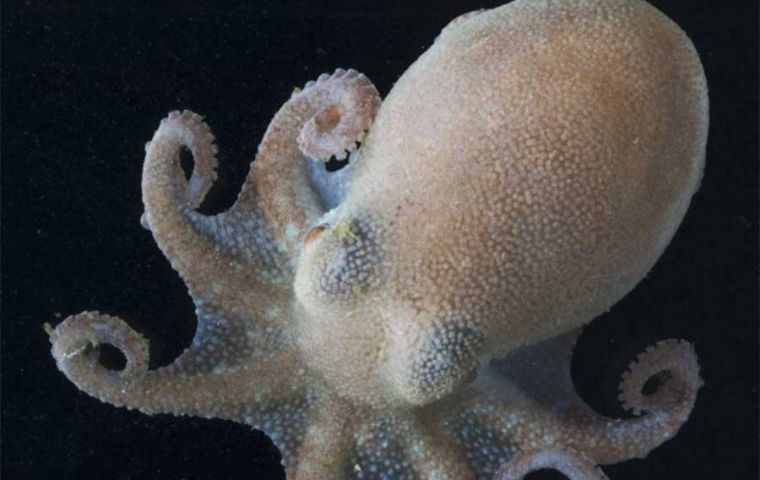MercoPress. South Atlantic News Agency
Octopus DNA helps to discover evolution of the West Antarctic Ice Sheet collapse
 Octopus, probably Pareledone species, from 500m depth on the Bellingshausen Sea continental shelf.Pic BAS.)
Octopus, probably Pareledone species, from 500m depth on the Bellingshausen Sea continental shelf.Pic BAS.) Scientists, including from British Antarctic Survey, have used octopus DNA to discover that the West Antarctic Ice Sheet (WAIS) likely collapsed during the Last Interglacial period around 120,000 years ago – when the global temperatures were similar to today.
This provides the first empirical evidence that the tipping point of this ice sheet could be reached even under the Paris Agreement targets of limiting warming to 1.5-2oC.
The study, published in the journal Science, was led by Professor Jan Strugnell, Chief Investigator, and Dr Sally Lau, Postdoctoral Research Fellow from ARC Securing Antarctica’s Environmental Future at James Cook University, Australia.
Professor Strugnell said the team’s research solves a long-running mystery that has puzzled scientists about whether the WAIS collapsed during the Last Interglacial.
“This was a period when global average temperatures were 0.5 – 1.5 oC warmer than preindustrial levels, but global sea level was 5 – 10 meters higher than today.”
“What makes the WAIS important is that it is also Antarctica’s current biggest contributor to global sea level rise. A complete collapse could raise global sea levels by somewhere between 3 and 5 meters
“Understanding how the WAIS was configured in the recent past, when global temperatures were similar to today, will help us improve future global sea level rise projections,” said Professor Strugnell.
Dr Lau said that population genetics offered an exciting and novel approach to answering this question.
“DNA holds a history of its past and can be used to look back in time to pinpoint when different populations of animals were mixing and exchanging genetic material.”
Dr Katrin Linse, a marine benthic biologist at British Antarctic Survey, and one of the paper’s authors added: “This molecular study on a small benthic octopus shows us just how much the evolutionary history of Antarctic marine animals can help us to understand the glacial history of the Antarctic continent.”
The team compared the genetic profiles of Turquet’s octopus found in the Weddell, Amundsen, and Ross seas and found genetic connectivity dating back to the Last Interglacial.
Dr Lau added: “This genetic connectivity would only be possible if a complete collapse of the WAIS occurred during the Last Interglacial, opening seaways linking the present-day Weddell, Amundsen and Ross seas.
“This would have allowed octopus to travel across the opened straits and exchange genetic material, which we can see in the DNA of today’s populations.”
Professor Strugnell said the findings will support decision-making around adaptation and mitigation measures in coastal regions around the world.
Genomic evidence for West Antarctic Ice Sheet collapse during the Last Interglacial by Lau, S.C., et al is published in Science December 2023.
See https://www.science.org/doi/10.1126/science.ade0664



Top Comments
Disclaimer & comment rulesCommenting for this story is now closed.
If you have a Facebook account, become a fan and comment on our Facebook Page!